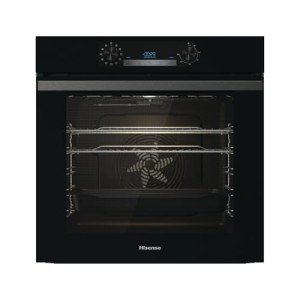A Brief History History Of Builtin Oven
The Comprehensive Guide to Built-In Ovens: Features, Benefits, and FAQs
Built-in ovens are a popular option for modern kitchen areas, offering versatility, performance, and a smooth design that incorporates flawlessly into cabinets. This article will delve into the various aspects of built-in ovens, including their features, benefits, installation options, upkeep ideas, and answers to frequently asked concerns.
What is a Built-In Oven?
A built-in oven is created to be set up within kitchen cabinets and is readily available in various setups, such as single or double ovens. Unlike freestanding ovens, built-in models offer a structured appearance and provide more flexibility in kitchen style. They come in electric, gas, and steam options, accommodating a series of cooking choices.
Features of Built-In Ovens
Built-in ovens are loaded with functions that improve cooking experiences. Here are a few of the most typical functions to consider:
Feature
Description
Self-Cleaning
Numerous models include a self-cleaning function that burns off residue at heats, simplifying upkeep.
Convection Cooking
This feature uses a fan to flow hot air, cooking food more evenly and rapidly.
Smart Technology
Some ovens come geared up with Wi-Fi connectivity, enabling users to manage the oven from another location by means of smartphone.
Several Cooking Modes
Consist of alternatives such as baking, broiling, roasting, and air frying, supplying flexibility for various dishes.
Temperature Probe
Keeps track of the internal temperature level of food, making sure completely prepared meals each time.
Sleek Design Options
Readily available in various finishes (stainless steel, black, white) to match kitchen decoration.
Benefits of Built-In Ovens
The installation of a built-in oven brings numerous benefits to any kitchen:
- Space Efficiency: Built-in ovens make the most of kitchen area, providing a tidy and orderly look without compromising functionality.
- Enhanced Cooking Performance: With sophisticated functions like convection cooking and precise temperature controls, built-in ovens frequently surpass traditional models.
- Style Flexibility: These ovens can be installed at eye level, permitting for easy gain access to without bending down, which can be especially beneficial for people with physical constraints.
- Enhanced Resale Value: A well-designed kitchen with top quality built-in appliances may attract prospective buyers, improving general property value.
- Customization Options: Many brands provide adjustable designs that fit the particular measurements and aesthetic of specific kitchen areas.
Installation Options
When selecting a built-in oven, comprehending the installation options is vital. Here are the most typical setups:
Single Built-In Oven: Ideal for smaller sized kitchen areas, these systems provide enough area to cook a range of dishes concurrently, perfect for everyday cooking.
Double Built-In Oven: Best matched for passionate cooks and large households, double ovens permit synchronised cooking at 2 various temperatures, perfect for meals that need varied cooking approaches.
Combination Steam and Oven: A hybrid solution that integrates the benefits of conventional baking with steam cooking. This option is excellent for maintaining wetness in foods, making it perfect for baking bread or roasting meats.
Maintenance Tips for Built-In Ovens
Maintaining a built-in oven is important for its durability and optimal efficiency. Here are some practical upkeep tips:
Regular Cleaning: Use the self-cleaning function when necessary, and wipe down the exterior and interior surface areas frequently to prevent grease accumulation.
Examine the Seals: Inspect the oven door seals for any wear or damage to ensure proper insulation and cooking performance.
Temperature Calibration: Occasionally check the temperature accuracy utilizing an oven thermometer, particularly if cooking times appear longer than normal.
Ventilation: Ensure sufficient ventilation around the oven to avoid getting too hot, especially for built-in models that might be surrounded by cabinets.
Frequently Asked Questions About Built-In Ovens
1. Are built-in ovens more pricey than freestanding designs?Yes, built-in ovens tend to be more costly due to their design, setup requirements, and additional functions. Nevertheless, their benefits can justify the expense in the long run.
2. Can you install a built-in oven yourself?While some useful individuals might try to install a built-in oven, it is suggested to work with a professional to make sure proper installation, ventilation, and safety requirements.
3. What is the average lifespan of a built-in oven?The typical life-span of a built-in oven is around 10 to 15 years, depending upon use and upkeep. Routine care can assist extend its longevity.
4. Are built-in ovens energy efficient?Many modern built-in ovens are designed with energy performance in mind, incorporating functions like insulation and exact temperature level controls that may decrease energy usage compared to older models.
5. built in oven hob packages built-in oven be fixed if it breaks?Yes, built-in ovens can often be fixed. It is a good idea to contact a certified professional for diagnoses and repairs to ensure safety and compliance with guarantee contracts.
Built-in ovens are an excellent addition to any contemporary kitchen, providing a mix of style, functionality, and advanced cooking features. With the right knowledge about their features, benefits, and maintenance, homeowners can make educated choices to boost their culinary experiences. As kitchen style trends continue to evolve, the built-in oven remains a staple for those aiming to mix aesthetic appeals with effectiveness in their cooking spaces.
